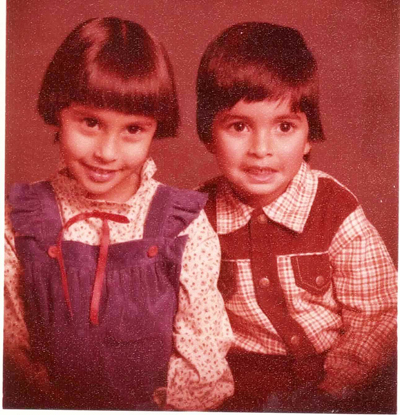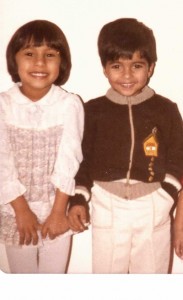By Anjum Choudhry Nayyar
 Raksha Bandhan is a festival primarily observed in India and Nepal, which celebrates the relationship between brothers, cousins and sisters. It is also called Rakhi Purnima in most of India. It is also celebrated in some parts of Pakistan. The festival is observed by Hindus, Sikhs and some Muslims. The central ceremony involves the tying of a rakhi (sacred thread) by a sister on her brother’s wrist. This symbolizes the sister’s love and prayers for her brother’s well-being, and the brother’s lifelong vow to protect her. The festival falls on the full moon day (Shravan Poornima) of the Shravan month of the Hindu lunisolar calendar.
Raksha Bandhan is a festival primarily observed in India and Nepal, which celebrates the relationship between brothers, cousins and sisters. It is also called Rakhi Purnima in most of India. It is also celebrated in some parts of Pakistan. The festival is observed by Hindus, Sikhs and some Muslims. The central ceremony involves the tying of a rakhi (sacred thread) by a sister on her brother’s wrist. This symbolizes the sister’s love and prayers for her brother’s well-being, and the brother’s lifelong vow to protect her. The festival falls on the full moon day (Shravan Poornima) of the Shravan month of the Hindu lunisolar calendar.
The brother-sister bond can be so strong and go through changes once a woman gets married and has her own children. Toronto mom of two, Prathna Negandhi, says her bond with her brother, Seetal, who is slightly younger than her, has gotten even stronger now that she’s a mom. For her, Rakhi is an opportunity to reflect on that relationship.

Prathna & her brother Seetal
“I look forward to Rakhi every year,” said Prathna. “Although I try to take care of my fiercely independent brother all year round, this is the day that I can make him the center of attention and he has to comply! Because he lives downtown, he’ll come up to suburbia where I live and we’ll have dinner together. I make his favorite dishes and he spends time with my kids. If we are in Calgary with our parents, Rakhi becomes a big family gathering.”
She says growing up in Calgary, they fought like most siblings do but due to their closeness in age, they were each other’s closest playmates.
“We grew up in Calgary at a time when there were not a lot of visible minorities. Being so close in age, we faced the challenges of growing up in a less then ideal environment together. In our teenaged years, Seetal was off doing his own thing. Since our parents were of a traditional mindset, i spent a lot more time at home.”
She says over the years, her little brother became more of an older brother and ‘protector’ especially when they went out together.
“Seetal has always been very level headed and has the ability to see things in a ways that make me think about situations differently. He’s always been the voice of reason for me and I value his opinions and views. He reminds me of my strengths, even if he doesn’t know it, and gives me a sense of security that you can only get from a relationship with a sibling.”

Prathna and her Brother Seetal
For Prathna, her brother Seetal also played a role in bringing her and her husband Hiten, together.
“When he turned 20, he came out to Toronto to go to school. I never realized how much a part of my everyday he was until he left. Seetal met Hiten and his sister through family that we shared through marriage. You know how convoluted relationships are in South Asian communities so I won’t get into that. By the time I turned 22, Seetal knew Hiten and his family well. He made a quiet suggestion that got to Hiten’s mom, who called her cousin in Calgary. Before we knew it, Hiten and I had met and here we are 12 years later.”
Prathna says her relationship with her brother has grown tremendously since she’s gotten married.
I became an adult overnight after getting married at such an early age. Seetal and my cousin Nisha were the only family I had in Toronto. I was still getting to know my new family. They were always there to help me navigate my way and were there when I needed support. He took the place of my parents for me until I was confident enough to feel comfortable in my new family.”
She adds that her relationship with her brother has been strong because of the example her parents set for them and Rakhi has always been a very important part of that traditional family upbringing.
“Nurturing relationships with your siblings is an on going process. We realize that as our lives change and we grow as individuals, our relationship with each other evolves and changes and we need to be open and forgiving. Understanding each others personalities is very important. Knowing when to be there for your sibling and when to leave them alone.”

Prathna says since having children of her own, her relationship with her brother has made all the difference. Her son is 8 and her daughter is 4 and a half years old. Seetal has proven to be a great role model for them as well.
My children learn from me what it means to be a sister. They learn from their father about the importance of being a good brother. They see the mutual love and respect between my brother and I. If your children are secure in the knowledge that whoever they are and whatever they do their sibling will love them unconditionally, they have a fighting chance at having a strong relationship with each other. It’s also important for them to know that because we are all individuals we might not always get along. However, that doesn’t mean that we love each other less. Nurturing respect oneself as well as for family members is also important.”

She says Rakhi is also a time for her kids to see their mom and mamu as siblings just like them, making time to remember what sibling relationships are all about.
They like to hear stories about us when we were growing up and I think that when they hear about positive or humorous things it re-enforces their bond. We make sure to do things together as a family. Ishaan knows that he is responsible for his sister and Saumya knows that she needs to look out for him. It is important that they see positive relationships around them. Seetal makes it a point to see and spend time with Ishaan and saumya at least once a week.”
How will you celebrate Rakhi this week? How do you show your children what it means to be a sibling?
©masalamommas and masalamommas.com, 2016-2017. Unauthorized use and/or duplication of this material without express and written permission from this site’s author and/or owner is strictly prohibited. Links may be used, provided that full and clear credit is given to masalamommas.com and Masalamommas online magazine with appropriate and specific direction to the original content.



There are no comments
Add yours